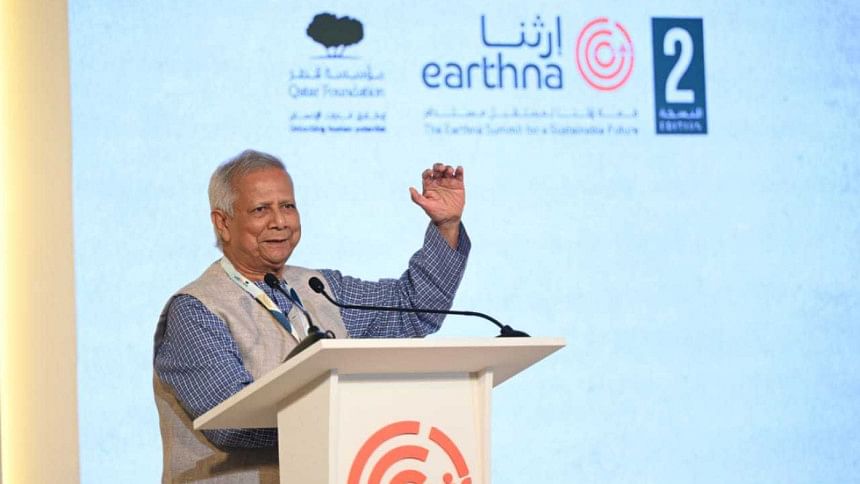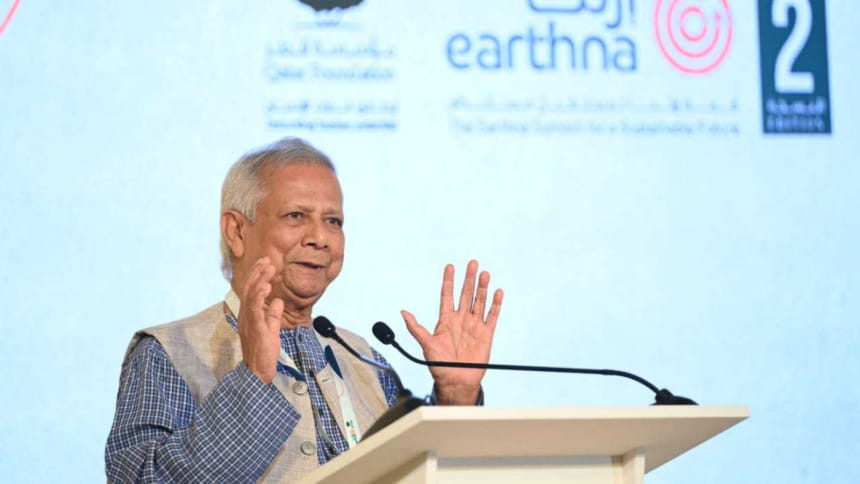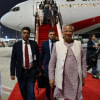No one too poor to dream, no dream too big to achieve: Yunus

Chief Adviser Prof Muhammad Yunus today said Bangladesh now stands at a turning point to forge a new social contract in which the state and its people, especially its youth, co-create a future rooted in inclusion, tradition, justice, dignity, and opportunity.
"A social contract in which financial inclusion and the empowerment of marginalized communities become integral. We want to stand as a beacon of hope for the world and invite our friends and partners to rewrite inclusive social contracts and to explore the role of social business, financial inclusion, and microfinance in fostering sustainable development and economic opportunities for the marginalized," Prof Yunus said in his keynote speech at Earthna Summit 2025 in Doha, Qatar.
The head of the interim government said, "Let us be bold. Let us build a world where no one is too poor to dream and no dream is too big to achieve."

The challenges before us are significant. But so too is our capacity for innovation, compassion, and collective action, Prof Yunus said, adding that Qatar with its initiatives like the Earthna Summit is demonstrating how a nation can harness innovation, tradition, and partnership to address the climate crisis, social inequality, and the future of work.
Prof Yunus said, in today's crisis-prone world, wars and conflicts erode rights and disrupt economies. Peace and stability are fundamental prerequisites for any meaningful and sustainable development.
"The world must not ignore the humanitarian crises that affect people from Palestine to the Rohingyas in Bangladesh. Impunity and blatant disregard for human rights are threats to development anywhere in the world. The ongoing suffering in Palestine concerns not just a region, but all of humanity. Palestinians are not expendable."
He said the protracted crisis in Myanmar continues to threaten regional stability. For years, Bangladesh has hosted over 1.2 million Rohingya refugees, bearing significant social, economic, and environmental costs. The UN Secretary-General recently visited the camps in a gesture of solidarity. While global efforts continue, world leaders must come together to ensure the safe, sustainable and dignified repatriation of the Rohingya people to their homes in Myanmar.
Prof Yunus said the climate crisis is also intensifying and the fact that funding for the global effort in this regard may dwindle in future is increasing. It is an existential threat for all of us.
"However, we are still continuing to uphold self-destructive values. We have chosen a lifestyle that works against nature; one that thrives on limitless consumption. Profit maximization is treated like the force of gravity, propelling every element of the system toward unsustainable outcomes."
He said safety of the environment demands a new way of living which is based on the principles of zero net carbon emissions, zero wealth concentration through the creation of social businesses, and zero unemployment by becoming entrepreneurs. "This is how we will create a new civilization that fosters sustainable development for everyone, everywhere."
Dr Yunus said, "We need to keep in mind that financial inclusion is not a matter of charity. It is a matter of justice. The exclusion of the poor from the financial system is one of the most powerful tools of disempowerment in our time. When people do not have access to capital, they cannot dream, they cannot build, and they cannot participate in shaping their own futures."
He added: "And yet we see over 1.4 billion people globally still unbanked—most of them women, most of them in rural areas, most of them yearning for an opportunity. By democratizing finance, we create a path for people to become job creators rather than job seekers. That is the essence of entrepreneurship—of human creativity being put to work, not for maximum profit, but for maximum impact."
Muhammad Yunus, a Nobel Peace Prize winner said, "We are aware that poverty is not created by poor people. It is a consequence of an economic system where resources surge upwards, concentrating wealth ever more narrowly. Social business armed with the power of financial inclusion can break free of this trap and can move millions out of poverty."
He also said, "Although we dream of a resilient, prosperous, and sustainable future for all, there are various threats that can derail our future development. We live in a time of profound uncertainty, where multilateralism is under serious threat, climate change is accelerating, geopolitical tensions are rising, and humanitarian crises are deepening."
He went on that emerging norms, technologies, and governance models are rapidly reshaping the world, rendering many past assumptions obsolete. "The urgency for renewed regional and global cooperation has never been greater."
Professor Yunus concluded saying, "I leave you with this: the future is not something we inherit. It is something we create. And each one of us has a role to play."

 For all latest news, follow The Daily Star's Google News channel.
For all latest news, follow The Daily Star's Google News channel. 






Comments